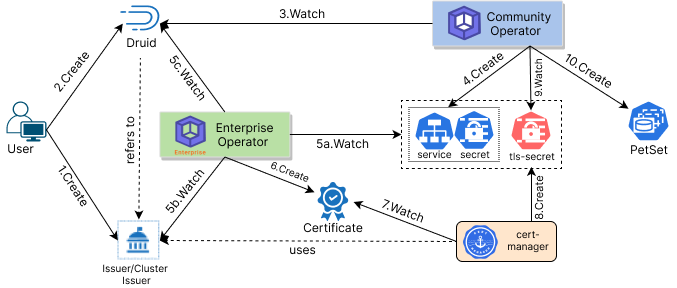You are looking at the documentation of a prior release. To read the documentation of the latest release, please
visit here.
New to KubeDB? Please start here.
Druid TLS/SSL Encryption
Prerequisite : To configure TLS/SSL in Druid, KubeDB uses cert-manager to issue certificates. So first you have to make sure that the cluster has cert-manager installed. To install cert-manager in your cluster following steps here.
To issue a certificate, the following crd of cert-manager is used:
Issuer/ClusterIssuer: Issuers, and ClusterIssuers represent certificate authorities (CAs) that are able to generate signed certificates by honoring certificate signing requests. All cert-manager certificates require a referenced issuer that is in a ready condition to attempt to honor the request. You can learn more details here.Certificate:cert-managerhas the concept of Certificates that define a desired x509 certificate which will be renewed and kept up to date. You can learn more details here.
Druid CRD Specification :
KubeDB uses following crd fields to enable SSL/TLS encryption in Druid.
spec:enableSSLtls:issuerRefcertificates
Read about the fields in details from druid concept,
When, enableSSL is set to true, the users must specify the tls.issuerRef field. KubeDB uses the issuer or clusterIssuer referenced in the tls.issuerRef field, and the certificate specs provided in tls.certificate to generate certificate secrets using Issuer/ClusterIssuers specification. These certificates secrets including ca.crt, tls.crt and tls.key etc. are used to configure druid server and clients.
How TLS/SSL configures in Druid
The following figure shows how KubeDB enterprise used to configure TLS/SSL in Druid. Open the image in a new tab to see the enlarged version.

Deploying Druid with TLS/SSL configuration process consists of the following steps:
At first, a user creates a
Issuer/ClusterIssuercr.Then the user creates a
DruidCR which refers to theIssuer/ClusterIssuerCR that the user created in the previous step.KubeDBProvisioner operator watches for theDruidcr.When it finds one, it creates
Secret,Service, etc. for theDruidcluster.KubeDBOps-manager operator watches forDruid(5c),Issuer/ClusterIssuer(5b),SecretandService(5a).When it finds all the resources(
Druid,Issuer/ClusterIssuer,Secret,Service), it createsCertificatesby usingtls.issuerRefandtls.certificatesfield specification fromDruidcr.cert-managerwatches for certificates.When it finds one, it creates certificate secrets
tls-secrets(server, client, exporter secrets etc.) that holds the actual certificate signed by the CA.KubeDBProvisioner operator watches for the Certificate secretstls-secrets.When it finds all the tls-secret, it creates the related
PetSetsso that Druid database can be configured with TLS/SSL.
In the next doc, we are going to show a step-by-step guide on how to configure a Druid cluster with TLS/SSL.



































